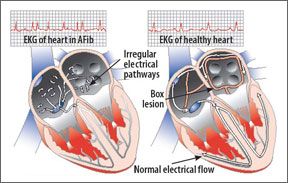Atrial fibrillation-commonly referred to as "AFib," a condition in which the atrial chambers of the heart pump abnormally-affects more than 2.2 million Americans. AFib occurs when erratic electrical impulses traveling through the heart cause an abnormal rhythm. Surgical treatment for AFib focuses on restoring the hearts normal rhythm. AFib is widely treated with medical therapy and is also managed by electrophysiologists using a radiofrequency ablation procedure with a patient under conscious sedation in the laboratory. AFib is also commonly treated surgically when the patient also requires heart surgery for another condition, such as mitral valve repair or coronary artery bypass. Surgery is uncommon for patients with AFib only, according to Marc Gillinov, MD, a cardiac surgeon at Cleveland Clinics Heart & Vascular Institute. Surgery may be considered if the patients abnormal heart rhythm cannot be controlled with medications, or medications are not tolerated or cannot be taken due to coexisting medical conditions.
To continue reading this article or issue you must be a paid subscriber.
Sign in






